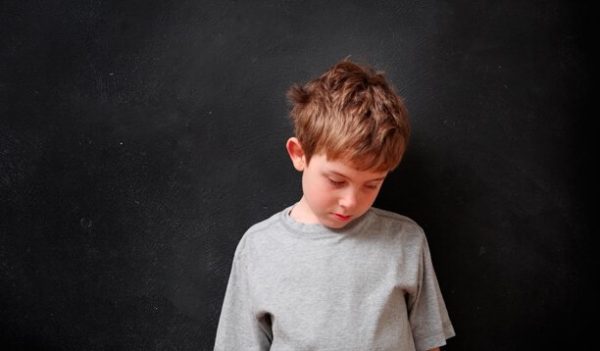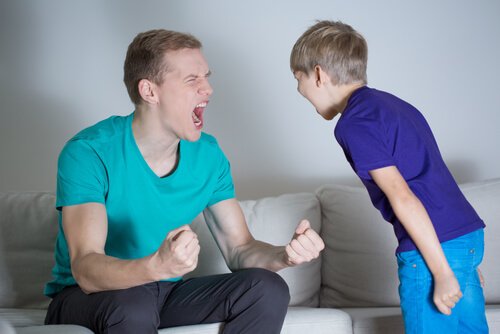2 Consequences of Yelling at Your Kids

Reflecting on the consequences of yelling at our kids can help us control ourselves and manage our impulse to do it. Analyzing where the yelling comes from and its causes are key to changing this behavior for good.
We all know the importance of educating our children from a place of respect. Plus, there are many resources and tools to avoid grounding them or shouting at them. Even so, during moments in which we feel overwhelmed, we could feel the urge to yell at our kids. These situations make us feel guilty, frustrated, and as if we were bad parents.
However, some parents don’t realize the very negative consequences that stem from this kind of behavior. In this article, we’ll talk about two of the most dangerous ones that will affect the development of our kids’ adult lives.
“Shouting the truth doesn’t make it more truthful.”
-Alejandro Casona-
1. Yelling at our kids can affect their self-esteem
Yelling conveys a message of little patience and tolerance. When we’re desperate about something, we tend to raise our voices and ask things by shouting. But yelling at our kids can send a message that they’re doing things wrong. Even though we do it so they obey us, it makes them feel that they’re not meeting our expectations.

When this happens constantly, we convey the wrong idea. They can believe that, no matter what they do, the will never do it right. They also may feel that we’ll never be satisfied and nothing they do will make us happy. The feeling of not doing things right and that they deserve all the yelling is very likely to stay with them through their whole life.
The foundation of our kids’ self-esteem come from the outside. With love and acceptance, their role models have to make them feel they can do anything. This doesn’t mean we have to fill them with fake confidence. Sometimes it’s necessary for them to get frustrated. However, it’s important that our expectations be adjusted to their age and their knowledge. And, foremost, we have to realize that our kids aren’t perfect.
“Every man who has nothing to say, shouts.”
-Enrique Jardiel Poncela-
Being understanding with our children
It’s very common, for example, to shout at our kids in the morning when we’re in a rush to take them to school. Nonetheless, we can’t expect kids to do their tasks as fast as we do. Their “speed” will depend on their age and on their level of autonomy. Maybe they need a hand to get ready and be on time.
If we give don’t give them enough time or we ask something of them that’s above their capabilities, it’s only normal that they won’t be able to complete the task. Then, we’ll end up yelling and making them feel that they can’t do it. The message they get in these situations is that we don’t love them because we consider them incapable.
We have to remember that our mission is to help them until they become more independent. This way, we encourage true confidence in themselves. With time, our kids will start acting properly. They will respect their parents, help around the house, or clean their room. However, they won’t do it from a place of fear. Their actions will come from the understanding of their role and the belief that they’re able to do anything by themselves.
“When discussing something, the truth is said not by the one who shouts, but by the one who is able to bind their arguments properly.”
-Fernando Savater-
2. Yelling teaches them the wrong way to deal with their emotions
We must be a role model to our children. When we constantly yell and lose our temper, this means these situations make us lose our cool. The message we convey is that we’re not able to control ourselves. The little ones learn that yelling is a proper response to stress. They take in this way of acting and they’re likely to replicate it in the future.
“What kind of life can it be if it starts with the mother’s yelling and the child’s crying?”
-Baltasar Gracián-

Therefore, it’s our responsibility to learn to deal with our emotions. In spite of us feeling afraid, tired, or angry, we have to control ourselves in front of the little ones. Yelling at our children due to stress only teaches them that anger is a good enough reason to mistreat others.
It’s not their fault that we feel upset or anxious every time they take a step. Even if it’s hard, it’s important to encourage them to explore and discover who they really are. Our role is to accompany them in their adventures. We also must discover where our negative emotions come from.
Maybe we need them to behave the way we want them to and not according to who they really are. Maybe we’re scared they may suffer or harm themselves. Nevertheless, yelling at our kids to protect them or channel their actions is usually not a good idea. Believing that things will go well for them, given that they’re capable of taking care of themselves, is better.
“It baffles me the way she expresses herself by shouting and her instability by the noise, that I started to suspect she is either truly pleased by it or terrified of silence.”
-César González Ruano-
Conclusion
In this article, we talked about the most negative effects of yelling at our kids. Given how harmful this behavior can be, both parents have to learn to control their emotions. They can also learn more effective ways of solving problems and facing conflict.
However, if you’ve ever yelled at your children, don’t punish yourself for it. Nobody is perfect. What’s important is that you change this behavior now that you know its severe consequences.
Reflecting on the consequences of yelling at our kids can help us control ourselves and manage our impulse to do it. Analyzing where the yelling comes from and its causes are key to changing this behavior for good.
We all know the importance of educating our children from a place of respect. Plus, there are many resources and tools to avoid grounding them or shouting at them. Even so, during moments in which we feel overwhelmed, we could feel the urge to yell at our kids. These situations make us feel guilty, frustrated, and as if we were bad parents.
However, some parents don’t realize the very negative consequences that stem from this kind of behavior. In this article, we’ll talk about two of the most dangerous ones that will affect the development of our kids’ adult lives.
“Shouting the truth doesn’t make it more truthful.”
-Alejandro Casona-
1. Yelling at our kids can affect their self-esteem
Yelling conveys a message of little patience and tolerance. When we’re desperate about something, we tend to raise our voices and ask things by shouting. But yelling at our kids can send a message that they’re doing things wrong. Even though we do it so they obey us, it makes them feel that they’re not meeting our expectations.

When this happens constantly, we convey the wrong idea. They can believe that, no matter what they do, the will never do it right. They also may feel that we’ll never be satisfied and nothing they do will make us happy. The feeling of not doing things right and that they deserve all the yelling is very likely to stay with them through their whole life.
The foundation of our kids’ self-esteem come from the outside. With love and acceptance, their role models have to make them feel they can do anything. This doesn’t mean we have to fill them with fake confidence. Sometimes it’s necessary for them to get frustrated. However, it’s important that our expectations be adjusted to their age and their knowledge. And, foremost, we have to realize that our kids aren’t perfect.
“Every man who has nothing to say, shouts.”
-Enrique Jardiel Poncela-
Being understanding with our children
It’s very common, for example, to shout at our kids in the morning when we’re in a rush to take them to school. Nonetheless, we can’t expect kids to do their tasks as fast as we do. Their “speed” will depend on their age and on their level of autonomy. Maybe they need a hand to get ready and be on time.
If we give don’t give them enough time or we ask something of them that’s above their capabilities, it’s only normal that they won’t be able to complete the task. Then, we’ll end up yelling and making them feel that they can’t do it. The message they get in these situations is that we don’t love them because we consider them incapable.
We have to remember that our mission is to help them until they become more independent. This way, we encourage true confidence in themselves. With time, our kids will start acting properly. They will respect their parents, help around the house, or clean their room. However, they won’t do it from a place of fear. Their actions will come from the understanding of their role and the belief that they’re able to do anything by themselves.
“When discussing something, the truth is said not by the one who shouts, but by the one who is able to bind their arguments properly.”
-Fernando Savater-
2. Yelling teaches them the wrong way to deal with their emotions
We must be a role model to our children. When we constantly yell and lose our temper, this means these situations make us lose our cool. The message we convey is that we’re not able to control ourselves. The little ones learn that yelling is a proper response to stress. They take in this way of acting and they’re likely to replicate it in the future.
“What kind of life can it be if it starts with the mother’s yelling and the child’s crying?”
-Baltasar Gracián-

Therefore, it’s our responsibility to learn to deal with our emotions. In spite of us feeling afraid, tired, or angry, we have to control ourselves in front of the little ones. Yelling at our children due to stress only teaches them that anger is a good enough reason to mistreat others.
It’s not their fault that we feel upset or anxious every time they take a step. Even if it’s hard, it’s important to encourage them to explore and discover who they really are. Our role is to accompany them in their adventures. We also must discover where our negative emotions come from.
Maybe we need them to behave the way we want them to and not according to who they really are. Maybe we’re scared they may suffer or harm themselves. Nevertheless, yelling at our kids to protect them or channel their actions is usually not a good idea. Believing that things will go well for them, given that they’re capable of taking care of themselves, is better.
“It baffles me the way she expresses herself by shouting and her instability by the noise, that I started to suspect she is either truly pleased by it or terrified of silence.”
-César González Ruano-
Conclusion
In this article, we talked about the most negative effects of yelling at our kids. Given how harmful this behavior can be, both parents have to learn to control their emotions. They can also learn more effective ways of solving problems and facing conflict.
However, if you’ve ever yelled at your children, don’t punish yourself for it. Nobody is perfect. What’s important is that you change this behavior now that you know its severe consequences.
This text is provided for informational purposes only and does not replace consultation with a professional. If in doubt, consult your specialist.







